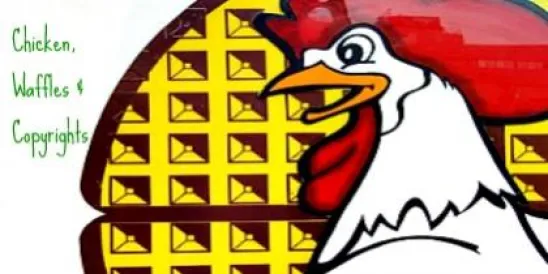In an unpublished opinion, the U.S. Court of Appeals for the Ninth Circuit upheld a district court’s grant of summary judgment against the owner of Roscoe’s House of Chicken ‘n Waffles chain restaurants for copyright infringement. Range Road Music, Inc., et al. v. East Coast Foods, Inc., et al. Case Nos. 10-55691; -55800 (9th Cir., Jan. 12, 2012).
The plaintiffs, a group of copyright owners, sued the defendants for copyright infringement for violation of the plaintiffs’ public performance rights in various songs.The plaintiffs filed suit following a private investigator’s visit to Roscoe’s Long Beach, California location, where the investigator heard a live band in the adjacent Seabird Jazz Lounge perform various Coltrane standards, as well as a DJ who played another set of copyrighted songs from a compact disc.The plaintiffs alleged that the American Society of Composers, Authors, and Publishers (ASCAP) had tried to license public performance rights to the restaurant and lounge for years but the defendants had refused.The district court granted summary judgment to the plaintiffs, awarding $36,000 for eight counts of copyright infringement and attorneys’ fees of $162,000.East Coast Foods appealed.
On appeal, the defendants argued that in order to establish copyright infringement, the plaintiffs were required to prove “substantial similarity” between the plaintiffs’ copyrighted musical compositions and the works performed publicly in the lounge.The 9th Circuit disagreed, explaining that substantial similarity is not an element of copyright infringement, for which a plaintiff must demonstrate ownership of a valid copyright, as well as copying of constituent elements of the work that are original.Instead, substantial similarity is a doctrine that helps determine whether copying of original elements of a work has occurred.In this case, substantial similarity was irrelevant because the plaintiffs were able to produce evidence from the private investigator that the copyrighted works themselves were publicly performed.
The defendants also argued that evidence from the plaintiffs’ private investigator should have been excluded because he was never certified as an expert witness.Finding that the district court did not abuse its discretion by admitting the investigator’s testimony, the 9th Circuit noted that the defendants did not dispute any of the information contained in the investigator’s declaration.Further, the court found that identifying popular song titles does not require “scientific, technical, or other specialized knowledge,” and thus, no certification was necessary.
The defendants further argued that certain defendants could not be held liable for vicarious infringement because the Long Beach Roscoe’s restaurant and the adjoining jazz lounge were owned by a separate company, Shoreline Foods.After finding that defendant Herbert Hudson is the president of both East Coast Foods and Shoreline Foods, with managerial authority over the Long Beach restaurant and lounge, the court found that the defendants controlled and derived financial benefit from the infringing performances, and thus were vicariously liable for copyright infringement.
Finally, the defendants argued that the district court’s award of $162,000 in attorneys’ fees was an abuse of discretion.The 9th Circuit affirmed the fee award, however, noting that the district court provided a reasonable explanation for same. In particular, the district court found that the defendants could have avoided liability by properly licensing the compositions from ASCAP at any time since 2001.Furthermore, the court agreed that a significant portion of the fees incurred by plaintiff’s attorneys were related to defendant’s “obfuscation of the corporate structure of Roscoe’s.”




 />i
/>i
